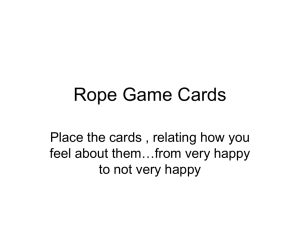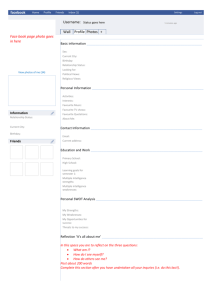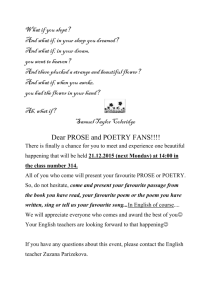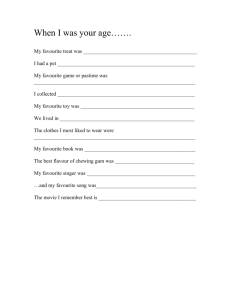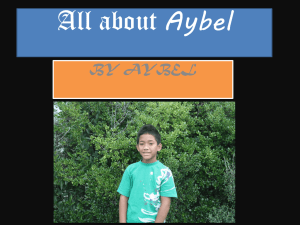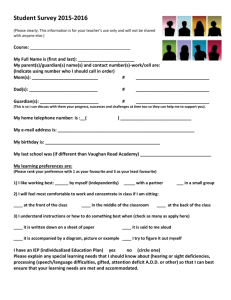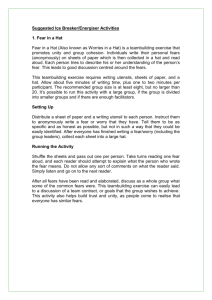EPiCC Activity - Favourite Things
advertisement
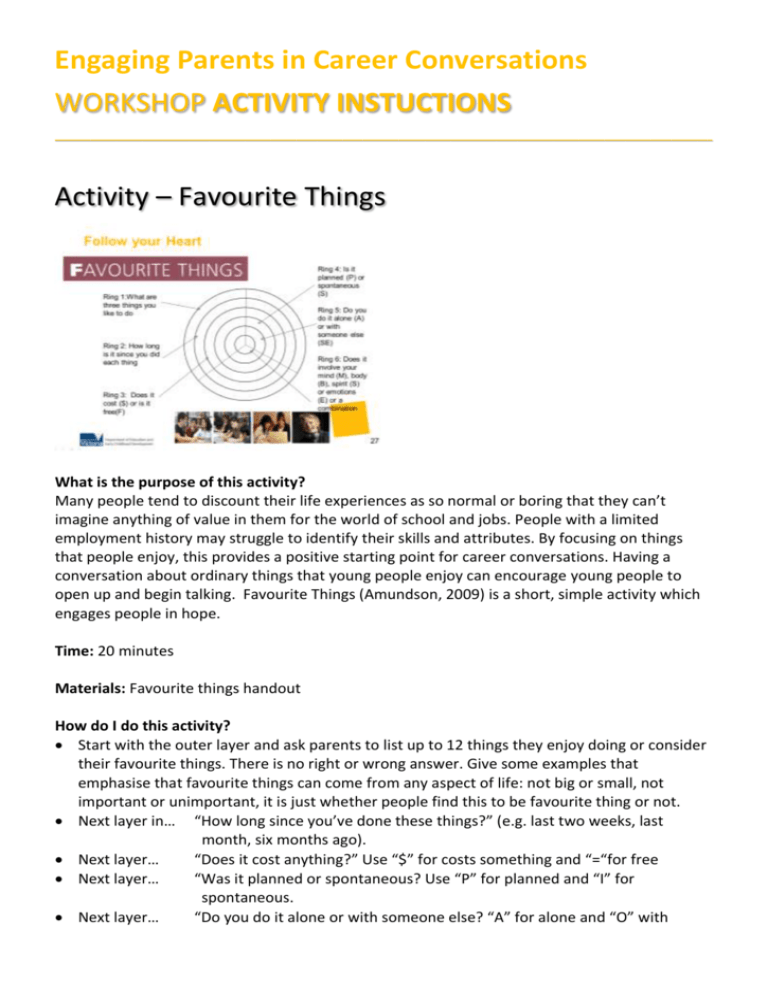
Engaging Parents in Career Conversations WORKSHOP ACTIVITY INSTUCTIONS ________________________________________________________________________________________________________________________________ Activity – Favourite Things What is the purpose of this activity? Many people tend to discount their life experiences as so normal or boring that they can’t imagine anything of value in them for the world of school and jobs. People with a limited employment history may struggle to identify their skills and attributes. By focusing on things that people enjoy, this provides a positive starting point for career conversations. Having a conversation about ordinary things that young people enjoy can encourage young people to open up and begin talking. Favourite Things (Amundson, 2009) is a short, simple activity which engages people in hope. Time: 20 minutes Materials: Favourite things handout How do I do this activity? Start with the outer layer and ask parents to list up to 12 things they enjoy doing or consider their favourite things. There is no right or wrong answer. Give some examples that emphasise that favourite things can come from any aspect of life: not big or small, not important or unimportant, it is just whether people find this to be favourite thing or not. Next layer in… “How long since you’ve done these things?” (e.g. last two weeks, last month, six months ago). Next layer… “Does it cost anything?” Use “$” for costs something and “=“for free Next layer… “Was it planned or spontaneous? Use “P” for planned and “I” for spontaneous. Next layer… “Do you do it alone or with someone else? “A” for alone and “O” with Engaging Parents in Career Conversations others. Next layer… “Does it involve mind – “M”, body – “B”, spirit – “S”, emotion - “E”, or a combination?” Ask parents to reflect on what they like most about their lists. They may also consider whether anything surprised them. Invite reflection on the patterns they see in their circle “Have you done these things recently or has it been a while?” or “Do you tend to do most things for free or do they cost money?” Patterns may also be seen across questions; for example someone may see that the things they do alone tend to be free and the things they do with others tend to cost money. As they review their answers, ask them to note those things they already knew about themselves and the things that surprised them. Remind them that there are no right or wrong answers. The answers are meant only to help them think about their lives and who they are. Discuss any patterns or surprises. Depending on group size, you may have parents complete and share the following sentences in pairs on the handout: “I was pleased that ____________________”; “The things that surprised me were ______________________ “; What are some variations of this activity? Write one volunteered example in the middle of the whiteboard. Who does this sort of thing in their job? Use an example that is more common such as walking (Who walks in their job?) or skateboarding (Who gets paid for work involving skateboards, etc.?) Invite parents to brainstorm all the possible ways a person could build on their favourite thing to earn money. Encourage diversity. Record all ideas on the whiteboard. Debrief. While some ideas might be outrageous, others may represent a potential avenue to explore further. The things we enjoy can be powerful motivators for action. Point out that this activity is also intended to make a very serious point. Very often, we forget to start with the basics – by asking our teenagers and ourselves the question: “What do you love to do?” Parents are uniquely positioned to observe – so pay attention and notice what their teenager loves to do. What can’t your teenager stop themselves from doing? Rather than focusing on their activities (the “what”), it can be very instructive to ask them what it is about the activity that they love (the “why”). Things to consider when using this activity: You have the option of using either of the following templates where participants can complete up to 12 things or 3 things. Engaging Parents in Career Conversations Favourite Things Ring 1: What are three things you like to do? Ring 2: How long is it since you did each thing Ring 3: Does it cost ($) or is it free (F) Adapted from “Guiding Circles”, McCormick, Amundson & Poehnell Ring 4: Is it planned (P) or spontaneous (S) Ring 5: Do you do it alone (A) or with someone else (SE) Ring 6: Does it involve your mind (M), body (B), spirit (S) or emotions (E) or a combination


